#poetry review
Text
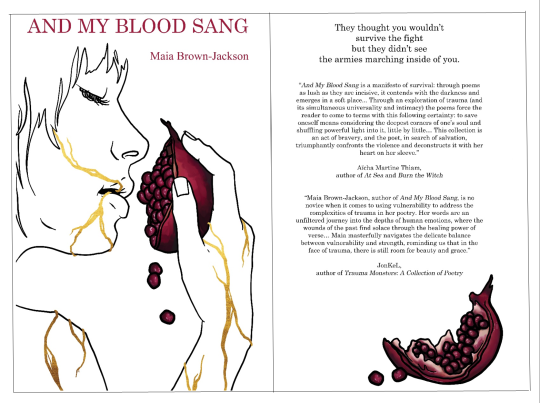
Kintsugi. The Yazidi people. Trauma. Resilience.
Just try the chapbook. Why the fuck not?
Literally just described as: "the best part of the movie/story where the character just went through hell but here they come back, battered and bruised but you can tell they are about to kick ass, that scene right there ! Right as they come out the fire and burning building
its super vulnerable way, very honest but also very hopeful . Its not sad poetry at all, there’s a huge theme of perseverance , like Girl-as-Lion! That one is great!! The last bit of that is damn!"
58 notes
·
View notes
Text

So this last year, though I didn't read too much fiction, I read a lot of poetry, most of which was from poets I had never read before. Here are my favourite poetry books of those I read in 2023 (trigger warnings I noticed in the read more).
Bright Dead Things by Ada Limón (5/5)
An intimate, beautifully sincere look into a vulnerable space of life, loss, love, and lust. Limón expresses herself with exquisite language, without the aftertaste of pretence. I had never read Limón's work previously, but I will be looking at her back catalogue.
C+nto & Othered Poems by Joelle Taylor (4.5/5)
I had never read Joelle Taylor before; however, it became evident almost immediately that she is an extremely skilled and experienced poet and wordsmith. Taylor's writing is intentional and powerful, with times of both great beauty and brutality. The collection itself is centred around reflecting on butch counterculture.
Always Italicise: How to Write While Colonised by Alice Te Punga Somerville (4.5/5)
Always Italicised is a wonderful collection centred around a visually powerful concept of italicising foreign (non-native) words following the suggestion that foreign (non-English) words should be italicised in a fantastic act of malicious compliance. The primary focus is on colonisation and Te Punga Somerville's experience as a Māori writer and scholar in Aotearoa. Reflecting on the loss of language, the stigma and the historical oppression that Maori people have experienced/continue to experience as a consequence of colonisation.
The World Keeps Ending, and the World Goes On by Franny Choi (4.5/5)
This book has my favourite title of the year and the poetry lives up to it. My previous experience with Choi was in her spoken word work and I found this collection just as enjoyable, I listened to her narration on audiobook while reading along and found the poems to be beautifully reflective, personal, and rich in atmosphere.
Flèche by Mary Jean Chan (4/5)
Chan's short collection is complex and interesting, she mainly reflects on her relationship with her mother, and her experiences as a queer person of colour. The collection feels raw in a beautiful and occasionally painful way.
The Trees Witness Everything by Victoria Chang (4/5)
Another banger of a title. I really loved the imagery in Chang's writing. She writes with intent and skill which is obvious from the get-go. While I struggled to connect with this collection on an emotional level I still was in awe of it on a technical level.
Bright Dead Things by Ada Limón
Graphic: Grief, Death, Death of parent, and Terminal illness
Moderate: Animal death, Racial slurs, Xenophobia, and Racism
Minor: Alcoholism and Drug abuse
C+nto & Othered Poems by Joelle Taylor
Graphic: Hate crime, Death, Lesbophobia, Homophobia, and Violence
Moderate: Misogyny, Sexual assault, and Sexual violence
Always Italicise: How to Write While Colonised by Alice Te Punga Somerville
Graphic: Colonisation
Moderate: Racism
Minor: Miscarriage
The World Keeps Ending, and the World Goes On by Franny Choi
Graphic: Death, Xenophobia, War, Racism, Violence, Grief, Police brutality, Sexual assault, and Colonisation
Moderate: Sexual violence, Sexism, Suicide, Rape, and Police brutality
Flèche by Mary Jean Chan
Graphic: Homophobia, Lesbophobia, and Racism
Moderate: Mental illness and Self harm
The Trees Witness Everything by Victoria Chang
Moderate: Death
#poetry#poem#poetry book#favourite#favourites#poetry collection#list#book list#2023#book recommendations#poetry reading#poetry recs#poetry review#best of#best of 2023#best poetry#favorite
24 notes
·
View notes
Text
Review: Myth and Romance: The Art of J.W Waterhouse
★★★★☆ - 4 stars

Myth and Romance: The Art of J.W Waterhouse, is a quick read and yet an outstandingly gorgeous one. This incredibly quick read (that only takes around 20 minutes to devour) intertwines classic poetry with beautiful art. It is art of women, described as Victorian waifs - intricate art that details them in pinnacle moments within their stories. The stories they devolve from range across the ages - from The Lady of Shallot to Hamlet to the goddess Ariadne. The title comes from two parts - the art included are equal parts poems by The Romantics (i.e. Byron and Keats) and mythological stories about Ariadne and Circe. It's a clever little book that showcases some amazing masterpieces of artistry and is bound to leave you with a love for J.W Waterhouse's work. I'd recommend this book to all lovers of art and poetry, to artists and poets themselves, and to the dark academics who pine after beauty.
#books#book blog#booklr#readblr#book reccs#book recommendations#bookaddict#bookworm#bookblr#dark academia#dark academism#dark academia books#art#art history#art books#poems#poetry#poetry review#j.w waterhouse#artwork
17 notes
·
View notes
Text
Teaching My Mother How to Give Birth - Review
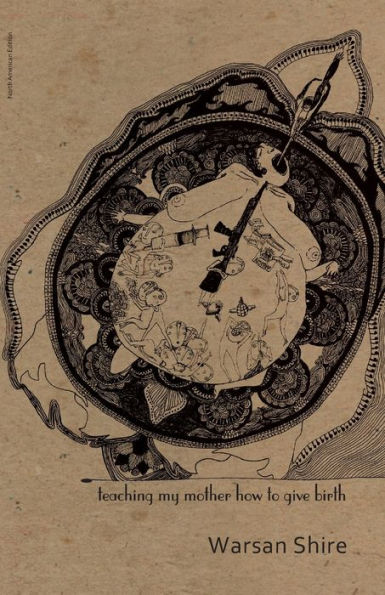
⭐:4.5
You ever open a poetry book only to have the breathe knocked out of you from the first page? That was me and Teaching My Mother How to Give Birth. After a string of disappointing poetry books (like this one), this was a much needed reset. After reading this I am not okay at all, (some of these poems rip your heart out along with your breath), but I'm so glad I borrowed this from my friend.
It's a very short book and I think everyone who is into that kind of poetry that shakes you at your core a bit should give this a try!
~Eli
Ace of All Trades, Pro at None😆
#ace of all trades#hobbies#hobby blog#books#book review#poetry#poetry book#poetry review#teaching my mother how to give birth#warsan shire
10 notes
·
View notes
Text
In Honor of National Poetry Month...




This is a Sylvia Plath appreciation post!
As you all may or may not know already—April is National Poetry Month, so I decided why not take this opportunity to talk about acclaimed poet Sylvia Plath. She's one of my favorites, and many people also agree she was an INFP! How cool is that? Her work is amazing, and she's inspired many other artists like Lana Del Rey. I have yet to read The Bell Jar still, but for now I'll talk about my favorite poems of hers: "Mirror" and "Mad Girl's Love Song."
Mirror
What I love about this poem the most would definitely be the imagery, because it's so beautiful. I also like how she compares the pink speckled wall to her heart. Overall my favorite lines are "Now I am a lake. A woman bends over me, Searching my reaches for what she really is." These lines really just speak to me, because I love how she's describing herself as a mirror in the way other people look into it. I also really like the imagery of the lake. To me it was unexpected, but clever. Like she's not a physical mirror but the lake is also a mirror by definition because it also reveals your reflection if you look at the surface.
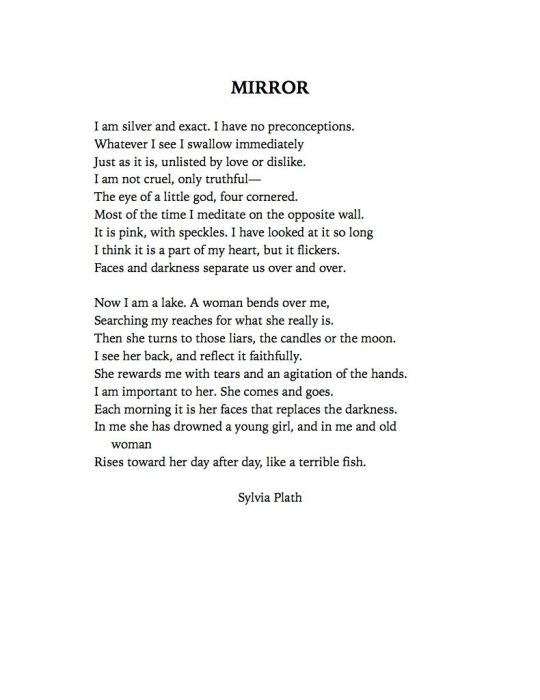
Mad Girl's Love Song
I love this poem for the same reason I love Mirror: the imagery haha. And honestly literally every about it just sticks with me. Also this poem is really relatable to me lol. When she said "I think I made you up inside my head" it really hit hard cus a lot of times I also question if I'm really in love with someone or if I'm in love with the romanticized version of them in my head.
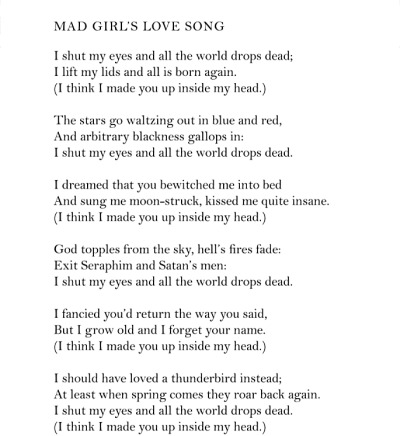
Anyway that's all! Hope you like it! :)
#sylvia plath#national poetry month#april 5#mbti#infp mbti#poetry#infp personality#infp#mbtiblogfun#myers briggs#mbti personalities#mbti types#typology#slyvia plath poems#poems and poetry#poetry analysis#poetry review
16 notes
·
View notes
Text
Readers wanted!!
I'm looking for people to read and review my new poetry book The Jellyfish before its release next February. If you are a poetry fan or writer I highly suggest you message me for the PDF version of the book.
The synopsis:
The Jellyfish is a collection of personal poems, showing the struggles of everyday life as a mentally ill queer person. Through love and hardship, art can be found and made, an outlet for those in need who have found themselves rejected by the ones in power. See the world through the spectacle of a young woman, find the anger and pain that sits under the skin and hides in the pages.
Again if you're interested please message me here and you'll get a free PDF of the book. Thank you! (And please share this around if you can!)
#writeblr#writers on tumblr#writerscommunity#writers and poets#female poets#poetry#queer poet#poetry review#new book#new author#my book#book review#reviewers wanted#readers wanted#new zealand writer#new zealand poet
2 notes
·
View notes
Text
I sit naked at my study
And drive my body
Into a dizzy dreamland
Where my schedules are followed in inverse
I knew and I promised it would be my last trip
But to no avail, you see
I'm tired for real
From trying myself
Trying my limits beyond stretchability
Exactly where nuclear bombs explode
It's nowhere near Nagasaki or Hiroshima though
As you possibly assumed
Y'all 'literal' freaks
It's where I seek love, even if only in its semblance
It's where I think life sprouts
And clouds sing
I'm tired, take me home
My clogs under my weight, pant
And I, under yours
I hear his voice
Where masculinity booms through
I offered him a seat
In my couch
And he offered me, on his crotch
Who am I then?
A host or a ghost?
I offered him a home
In my couch
Where my worries relax
Every afternoon
Post my gardening
I croon along the summer breeze
And I water my soppy saplings
And they all go to sleep
Except the snake-plants
I shamble around with my sorrows
And I knit them into my winter-wears
And inside our dak-bungalow
I let these silly sorrows play around
With my kittens as they seep silently in
Through my woody windows
I feed them sunlight
And crumbs of my broken soul
And I let them sleep under my
Queen-size bed with no sleep on it at all
- Carry On Carrion by ©vippik
#spilled words#spilled thoughts#spilled ink#poets on tumblr#poetry#blotchedpoems#writerscreed#writers on tumblr#new poets society#my poetic life#teacup13#writers creed#writersclub#poetry review#poetry reblog#reblog#art reblog#brownpoet#indianpoets#indian poet#indian poetry#english poetry#english poem#share#international poetry day#poetry portal#poeticstateofmind#poeticsoul#poeticstories#poeticstuff
15 notes
·
View notes
Text
so i've written this really long poem and was hoping if someone can read it and give me a little review on that? it'll mean a lot to me!! ❤️
10 notes
·
View notes
Text
The Art of Job Hunting by Anastasia Helena Fernald

Overall an interesting collection.
The collection is a satire on primarily unemployment and the job market, but also some other related stuff - the military, family, nationality.
There are a lot of strong sections in here, and the Q&A job application format works really wonderfully. Fenald has a recognisable voice, and the rhythm and cadance of her work is varied but consistent enough to feel cohesive.
The poems on nationality and foreign-ness are particularly good and fitted well with the story-telling style used in many of the poems.
There is also very clearly a lot of experimentation going into these poems. There is a huge range in the style and the poems that really stood out were the ones which didn't quite blend in with the rest of the collection.
The couple of poems that leant into the absurdism/tried to approach the topic from an unexpected place really broke up the literalism that most of the collection stayed close to.
It's also worth mentioning that the author clearly had a message to put across, and although the focus wasn't exclusively on one topic, the central ideas were portrayed clearly and without spoon-feeding the reader.
It isn't a perfect collection, however.
The core frustration and bitterness of unemployment is not particularly a subtle theme, and at times the "show don't tell" rule may have been ignored a little. There are sections where the message of frustration becomes frustrating in itself - the collection feels cathartic in places but such a barrage of hopelessness does become a little hard to get through in places.
The poems also felt very tonally American, and while this isn't a problem in and of itself, paired with the current-affairs heavy content started to feel a little like it was designed for social media.
The more heavily structured poems also fed into this too, OK Google, Define Job and Résumé Poem are two that felt very much intended to be seen outside of the collection, although this could also just be my personal taste coming through.
The collection does pick up by the end, though, and I think a lot of my frustrations are with the earlier poems which seem to be trying to set a tone, but do so in such a blatant way it can feel as though you are just being told what to think and feel about the topic, rather than being allowed to feel what the authour does through her writing.
Room to improve, and I certainly wouldn't rule out reading more of Fernald's work!
I received an advance review copy for free, and I am leaving this review voluntarily.
#poetry#poetry review#book review#books#this one was an advanced copy btw#had a good time#but definitely hoping for some growth in her work
2 notes
·
View notes
Text
From Inside the Chrysalis: A Review of Metamorphosis by Iluvia Triste

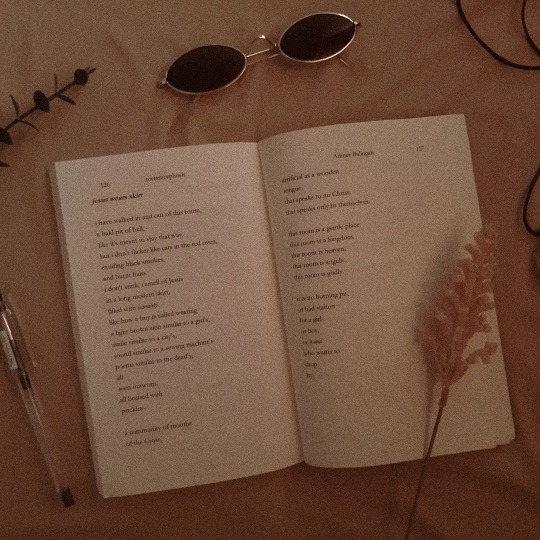

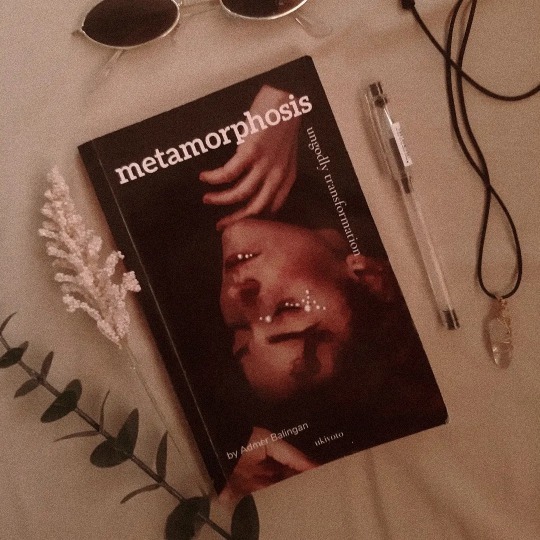
Like casually strolling inside the belly of a beast, there is something unsettling yet so natural about reading Iluvia Triste's (Admer Balingan) poetry in his first book, Metamorphosis published under Ukiyoto Publishing.
The collection starts with ‘The Birth’. Here, the poet is not afraid to use haunting metaphors that a normal person would turn away from in repulsion. The persona tours the reader in places in childhood where he got his wounds, as though a crime scene revisited by a survivor. The pieces are suffocating, yet empowering and enlightening – simply raw emotions in their textual form.
The readers will find themselves looking through a thick, giant, and sticky bubble, and the view resembles a subjective purgatory of an aborted child – if only distorted by the iridescence.
‘The Shedding’ follows. It tackles erosion and loss, both of physical form and sanity. Sweet Elvie hits too close to home, in particular, but the pages move on in a trancelike state. The persona possesses purity and naivety – ironically not that of a young child but that of Frankenstein’s monster. Each poem in this section beckons the readers to mourn.
“…the stars become feces… the people; become black teeth…” ‘The Growing’ is unhinged, fearless, and bold in its use of seemingly mundane words we encounter every day. Reading this feels like watching a tragic film creep and unfold in the streets and houses in an unheard-of province. A slice of life, if you will, but visceral and cut quite literally from the chest. The persona has the power to leave you feeling like a helpless prey to his demons. These are the words sprouting out of a body too disillusioned with itself to make sense of anything timid and inanimate enough to surround it. You can only read on as the persona seems to go down a spiral of self-hatred and madness, leaving behind an estranged body, much like Poe. My personal favorites are ‘november’ and ‘sundays devoid of flowers’ – poems written in styles much like mine, but madder and darker.
‘The Transformation’ is a refreshing break: it is not made of unadulterated healing, but mere glimpses of it. A tendency, I would say, for both relapse and self-acceptance. It talks about the kind of softness one finds against both flowers and tender wounds. It is about learning to live in your body after waging year-long wars against yourself. What makes this part stand out is perhaps the intentionality and consciousness in it – to tentatively step out of an outgrown shell while carrying within you the possibilities of stepping back in. What matters, though, is the intention. It is a great, hopeful way to end, and I am sure ‘jesus wears a skirt’ will stay with me years after I finished the book.
True to its description, this poetry book is indeed unconventional, raw, and unique. I truly hope that more readers who find themselves in crossroads, transitions, or personal metamorphosis, come across this book. Let your breaths be taken away as you flip through the pages of Metamorphosis, and you will find each one changed, restored, and made more authentic to who you are.
#fray narte#persephoneshellhounds#book review#poetry review#metamorphosis#admer balingan#iluva triste#ukiyoto publishing#indie poets#indie authors#poets#poetry#poetry book
11 notes
·
View notes
Text
Book Review: Haiku (2023)

https://rebeccacrunden.com/2023/05/08/book-review-haiku-2023/
3 notes
·
View notes
Text
[Blog #10] Spring 2023, Plath, Sexton and Lowell vs Olds, Flynn and Davis
Today, I am comparing and contrasting early Confessional poets -- Sylvia Plath’s “Lady Lazarus,” Anne Sexton’s “Wanting to Die” and Robert Lowell’s “Skunk Hour” -- to their Confessional contemporaries -- Sharon Olds’ “My Son the Man,” Nick Flynn’s “My Mother Contemplating Her Gun” and Olena Kalytiak Davis’ “Not This”.
For reference, confessional-style poetry or confessionalism is poetry that often incorporates first-person perspective to detail psychological struggles such as mental illness and/or childhood traumas.
Before I analyze the similarities and differences between those six poems, I would love to greet anyone who happens to stumble upon this blog post.
This is the link to my first blog post on Ada Limon’s The Carrying (2018):
My professor assigned a poetry book collection or individual poems every other week. My main objective was to dissect a few poems that left an impression on me while using his T.R.I.F.F.I.D. method.
Tone: the voice, mood, or attitude the reader believes the author is conveying through subject and word choice.
Rhythm: the pattern and beat between the stressed and unstressed word syllables.
Imagery: the details told through the five senses (touch aka physical, sound aka auditory, sight aka visual, taste aka gustatory and smell aka olfactory).
Figure: or figure of speech, is the non-literal expression of language. Figures of speech include hyperbole, irony, metaphor, simile, anaphora, antithesis and chiasmus.
Form: the way a poem is presented on paper or a screen. Think of how the author physically shapes the poem -- the use of dialogue, line spacing, paragraph breaks, rhythms and patterns.
Idea Density: how the author expresses their ideas throughout their poem. Can be literal (concrete) and/or figurative (vague or hidden).
Diction: the word choice and arrangement within a piece.
Part I:
The most noticeable difference between early and contemporary confessional poems are their forms. For example, both Sylvia Plath’s “Lady Lazarus” and Anne Sexton’s “Wanting to Die” have 3 lines per stanza, while Robert Lowell’s “Skunk Hour” has 6.
On the other hand, Sharon Olds’ “My Son the Man” is one long stanza compose of 15 lines; Nick Flynn’s “My Mother Contemplating Her Gun” is a bit harder to deduce where a stanza starts and end, but it seems to vary between 1–3 lines per stanza. Olena Kalytiak Davis’ “Not This” starts at 2 lines, then 11, and shifts back to 2 lines for the last three stanzas.
Part II:
I feel as though I can’t quite compare and contrast the early and contemporary poets’ idea density because they all similarly discuss mental health awareness/topics. Plath’s “Lady Lazarus” (Lazarus means a person who is resurrected from the dead) reveals the narrator’s (Plath’s) third suicide attempt by age thirty:
I have done it again.
One year in every ten
I manage it——
(...)
And I a smiling woman.
I am only thirty.
And like the cat I have nine times to die.
This is Number Three.
What a trash
To annihilate each decade. (1-3, 21-24)

Lowell’s “Skunk Hour” the narrator admits to his declining mental health -- feeling crazy, alone and depressed, so much so, he compared his state of mind to Hell:
My mind’s not right.
A car radio bleats,
“Love, O careless Love. . . .” I hear
my ill-spirit sob in each blood cell,
as if my hand were at its throat. . . .
I myself am hell;
nobody’s here— (30-36)
Sexton’s “Wanting to Die” is vaguely similar in topic to Plath as they both discuss “suicide,” though Sexton is more on the nose than Plath. In reference to the title, the narrator confesses to her desire to commit suicide:
Since you ask, most days I cannot remember.
I walk in my clothing, unmarked by that voyage.
Then the almost unnameable lust returns.
Even then I have nothing against life.
I know well the grass blades you mention,
the furniture you have placed under the sun.
But suicides have a special language.
Like carpenters they want to know which tools.
They never ask why build. (1-9)
Olds’ “My Son the Man” the narrator confesses that she is afraid of her son growing up and becoming his own person outside of her control/influence (maternal fears).

She compares herself to the chains strapped on Houdini, while her son is compared to Houdini himself:
Suddenly his shoulders get a lot wider,
the way Houdini would expand his body
while people were putting him in chains. It seems
no time since I would help him to put on his sleeper,
guide his calves into the gold interior,
zip him up and toss him up and
catch his weight. I cannot imagine him
no longer a child, and I know I must get ready,
get over my fear of men now my son
is going to be one. This was not
what I had in mind when he pressed up through me like a
sealed trunk through the ice of the Hudson,
snapped the padlock, unsnaked the chains,
and appeared in my arms. Now he looks at me
the way Houdini studied a box
to learn the way out, then smiled and let himself be manacled. (1-15)
Eventually, like all traps, Houdini figures them out and escapes, which is what the narrator fears her son will do to her when he matures.
Again, Flynn’s “My Mother Contemplating Her Gun” is similar to Plath and Sexton’s poems as it deals with the topic of suicide; as the title implies, the narrator is the mother.
Throughout the poem, the mother discusses the gun -- the act of suicide -- as insignificant or easy by down-playing the severity and adding colorful descriptions to the gun:
I bought it
when I didn’t feel safe. The barrel
is oily,
reflective, the steel
pure, pulled from a hole
in West Virginia. It
could have been cast into anything, nails
along the carpenter’s lip, the ladder
to balance the train. Look at this, one
bullet,
how almost nothing it is—
saltpeter sulphur lead Hell
burns sulphur, a smell like this.
safety & hammer, barrel & grip
I don’t know what I believe. (9-23)
Lastly, in Davis’ “Not This,” the narrator reveals she regrets not appreciating the little moments of family time in the past since the family dynamic has change -- the children growing up and the narrator (possibly) falling out of love with their spouse:
i raised my kids, they
grew i lost two pasts–i am
not made of them and they
are through.
we forget what
we remember:
each of the five
the fevered few
days we used to
fall in love. (10-19)

What did I learn?
The most noticeable difference between early and contemporary confessional poems are their forms; early poets stuck to a rigid line count, while their successors are more free-flowing.
Moreover, they all discuss mental health issues. Plath, Sexton and Flynn explore suicide in their poetry; Lowell, Olds and Davis wrote about varying topics: solitude, maternal fears and regret.
Whether early or contemporary, not all poets write about the same mental issues; even if two poets wrote about the same mental illness, they have differing voices, imagery, figures of speeches, etc.
Though, most confessional poets seem to share the same tone: melancholy, desolate, grim, mournful and pessimistic.
Spotlight Poet: Who is Sylvia Plath?
Some may only know Sylvia Plath by how she infamously died, rather than how she lived her life. I am here to correct that! Boston native Sylvia Plath specialized and was highly noted for her confessional poetry; her topics ranged from her mental struggles, self-image and familial and marital traumas. During her lifetime, Plath published two poetry collections: The Colossus and Other Poems (1960) and Ariel (1965).
One of her most well-known and studied poems is “Lady Lazarus” and “Daddy”. In the former, as discussed earlier, Plath confesses to her third suicide attempt, whereas in the latter, she recounts her patriarchal sufferings through her father’s death and the conflicting relationship with her husband (poet Ted Hughes).
In the end, Sylvia Plath’s poetry remained timeless and praised by her contemporaries and successors because of how relatable and descriptive her thoughts and emotions -- anguish, alienation and self-destruction -- are to the past and present literary communities.
For more information on confessionalism and poetry by Plath, Sexton, Lowell, Olds, Flynn and Davis, check out the links below:
Lastly, what are some of your favorite confession-style poems?
Feel free to share some below!
#poetry review#poetry book#poetry recs#Sylvia Plath#Anne Sexton#Robert Lowell#poems#early poetry#contemporary poetry#sharon olds#nick flynn#olena kalytiak davis#confessional poetry
6 notes
·
View notes
Text
Aristophanes’ Myth of Love
You have held me so tightly,
My body has melted into yours,
Our units combined,
The flatfish Zeus destroyed,
Those poor lovers split in two!
How we’ve angered him once more,
As your overgrown heart
Has filled what mine forever lacked;
Purposeful for the day you’d meet me,
Now forever intwinted in our truest form,
Our unknown wound - mended, healing.
Ancient suffering, the generational curse,
Ending only last fall.
The angry God has tried hard,
Though he fails to tear us apart!
Even Zeus stands weak to
The fufillment of our original unity.
Aristophanes’ myth of love,
Now incomplete,
As this story is unveiled
Every coming day.
ALM
If people could give constructive criticism on this poem, that would be very much appreciated as I am looking to submit this to get published.
#poetry#criticism#review#poetry review#poetry advice#writing#constructive criticism#constructivefeedback#ancient mythology#mythology#philosophy#philosophy of love#young writer#original poem#poem#poet#Amatuer Poetry#my poems
5 notes
·
View notes
Text
Review: Violet Bent Backwards Over The Grass
★★★☆☆ - 3 stars
"You can have a life beyond your wildest dreams
all you have to do is change everything"

I want to preface this by making it clear that I love Lana Del Rey's music. I think her sound (though in many ways similar to Radiohead, who is another beloved artist for me) is really something special and her lyrics are worthy of worship. All this being said Violet Bent Backwards Over The Grass was not the greatest poetry collection I've ever read. Though, it definitely wasn't the worst as Milk and Honey by Rupi Kaur currently holds that title (and I can't see it being stolen by another collection anytime soon).
Some poems in this collection are stunning, especially the haikus. I found most often that there would be a few lines per longer poem that would be worthy of highlighting. However, I think my main issue with this collection was Lana's grammar. I know I am going to sound like the grammar police here, but it was really getting on my nerves reading this that rather than saying you the letter 'u' would be used and rather than saying with or without the letter 'w' would be printed. Common as it may be in modern society to use letter abbreviations in texting, I personally don't feel that it belongs in poetry.
The use of photographs to accompany the poems was something I really liked - it really added to the atmosphere of the book. Though the energy of this book was truly established in the poetry, through depressing outlooks on life and the heartbreaking cries of a writer weeping in her spilled words on paper. Violets Bent Backwards Over The Grass is an intricate and shockingly beautiful poetry collection, with many lines leaving a profound impact upon me. It is undoubtedly the epitome of sad girl poetry.
#lana del rey#violet bent backwards over the grass#books#book blog#readblr#booklr#book reccs#book recommendations#bookaddict#book review#poetry#poems#poetry collection#poetry review#lana del rey books#lana del rey lyrics#lana del slay#poet#bookworm#books and reading#book lover#book community#bookblr#bookblogger#books and literature#books & libraries
2 notes
·
View notes
Text
Poetry Book Review : Thus Spoke, the Being Within by Ankit Panch
in which i take an indie poetry book and nitpick for a while...
read it here!
7 notes
·
View notes
Text
I Would Leave Me If I Could Book Review
~2.5 out of 5 stars~
If you’ve turned on the radio in the past few years, you have probably heard a Halsey song. She’s been a staple of popular music for the last decade. I like quite a bit of her music, casually - my favorite song of hers is “Nightmare” - so when I saw that she released a poetry book, I knew I wanted to read it.
The relationship between songs and poems has been long-discussed, and for good reason - the two are closely related, even historically intertwined, but modern songs and poems are distinct. Halsey’s I Would Leave Me If I Could does an incredible job at highlighting what those distinctions are. Unfortunately for Halsey, that does not make for a technically “good” poetry collection.
I’ll be frank: this is a difficult book to rate because Halsey writes poems exactly like she writes songs, so if you read it because you like Halsey’s music (particularly her lyrics, though I think if you’re familiar enough with her general sound, your brain will apply it over her poems - or at least, mine did), then you will probably like this book. However, if you read it because you like contemporary poetry, you will probably hate it. And so, as someone who falls into both of these categories, I closed the book and wondered, “Okay, what the fuck do I do with this?” Hence the dead-center rating I’ve given it.
But let’s back up a bit. What do I mean by “Halsey writes poems exactly like she writes songs” and why is that… not how contemporary poetry works? At its most basic, the difference between poems in a collection versus songs on an album is that one is visual and one is auditory. Now, obviously many poems are read aloud, and I think these ones are significantly better read aloud because they become closer to Halsey’s expertise when spoken (although still not exactly right, because speaking a poem is a different art than singing). Modern pop songs also have a strong symbiotic relationship to the music behind them - most are not spokeword or instrument-less. Poetry does not have this same support; instead, its closest analog is the space on the page. It is not coincidental that Halsey has a strong grasp on how space works in poetry - she leaves gaps between words, stanzas, and even letters, to support her poems where she would normally let her music back her singing. She does something similar with punctuation.
It is also not coincidental that she leans too much on this support. Spaces between words in poems do not carry the same weight as instruments backing lyrics in songs. The key component of poems are the words, whereas generally speaking, the lyrics are significantly less important to the success of songs (this is, of course, more or less true depending on the genre, but it is very true in pop music). Halsey sometimes sacrifices the cohesiveness of her message for a clever, catchy rhyme; this is vital to the success of a pop song, but it is the equivalent of shooting yourself in the foot when writing poetry, especially contemporary free verse (Halsey’s preferred format) which tends to not rhyme much at all and certainly does not make rhyme a requirement.
Halsey brings the directness of a songwriter to her poems as well. Nothing can be left to the imagination. She will tell you explicitly how she feels about whatever topic her poem is exploring. This is not really how contemporary poetry works; nowhere is the old adage of ‘show, not tell’ more imperative than in contemporary poetry. I am not musically adept enough to explain why it works for pop music (something something the lyrics are secondary to the music that is invoking your emotions without stating them outright??), but I am confident it does not work for the kind of poetry that is prioritized nowadays.
This is not to say I think Halsey’s poetry is “bad.” The poetry world is full of snobs who could use a shakeup, and songwriters turned poets have the potential to do just that. I don’t know that it’s terribly good, either, though - setting aside her tendency to write like a songwriter rather than a poet, most everything she writes is in desperate need of being cut in half or otherwise pared down.
That all said, I Would Leave Me If I Could does the most important thing it needs to do: it caters to the existing audience of Halsey fans. And hey, that’s commendable in and of itself. So that is what gives it the rating of 2.5 out of 5 stars. Read it if you like Halsey; don’t read it if you like poetry.
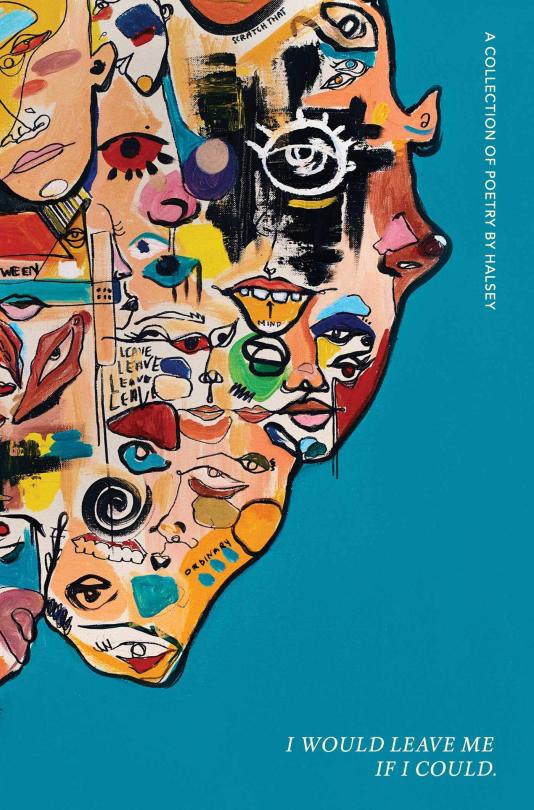
#i would leave me if i could#halsey#2.5 out of 5 stars#book reviews#my book reviews#poetry collections#poetry review#my poetry review
6 notes
·
View notes